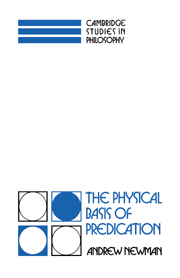Book contents
- Frontmatter
- Contents
- Acknowledgements
- Introduction
- Chapter 1 “Real constituents of the world”
- Chapter 2 What can logic and language tell us about reality?
- Chapter 3 The “existence” of universals and the notion of possibility
- Chapter 4 The causal significance of basic attributes
- Chapter 5 Hierarchies of universals
- Chapter 6 Causal relations
- Chapter 7 Arbitrary particulars and unified particulars
- Chapter 8 Further considerations concerning the causal relation
- Chapter 9 Arbitrary particulars and physical objects
- Bibliography
- Index
Chapter 6 - Causal relations
Published online by Cambridge University Press: 04 May 2010
- Frontmatter
- Contents
- Acknowledgements
- Introduction
- Chapter 1 “Real constituents of the world”
- Chapter 2 What can logic and language tell us about reality?
- Chapter 3 The “existence” of universals and the notion of possibility
- Chapter 4 The causal significance of basic attributes
- Chapter 5 Hierarchies of universals
- Chapter 6 Causal relations
- Chapter 7 Arbitrary particulars and unified particulars
- Chapter 8 Further considerations concerning the causal relation
- Chapter 9 Arbitrary particulars and physical objects
- Bibliography
- Index
Summary
REAL RELATIONS
We are happy to say that certain particulars exist and are real, and this lends credibility to the idea that basic attributes are real constituents of the world. The reason is that basic attributes inhere in particulars and are thought of as in some way constituents of particulars, contributing to their reality. Relations, on the other hand, seem to have a shadowy sort of existence; they seem to hang between particulars. Intuitively, it is difficult to regard relations as real constituents of the world.
According to Gottfried Martin this intuition found expression in mediaeval metaphysics. For Aquinas the being of an accident (i.e. an attribute) was a matter of its existing in an individual being “Esse accidentis est inesse” – for an accident, to be is to inhere: “A relation, considered as a real accident, would be an accident which stood so to speak with one foot in one substance and the other in another, and this contradicts the idea of an accident as inherent in a particular individual being.” This point of view leads to the doctrine that all relations are “relations of reason”, in other words that they are things produced by thought and that there are no such things as “real relations”.
- Type
- Chapter
- Information
- The Physical Basis of Predication , pp. 136 - 164Publisher: Cambridge University PressPrint publication year: 1992



